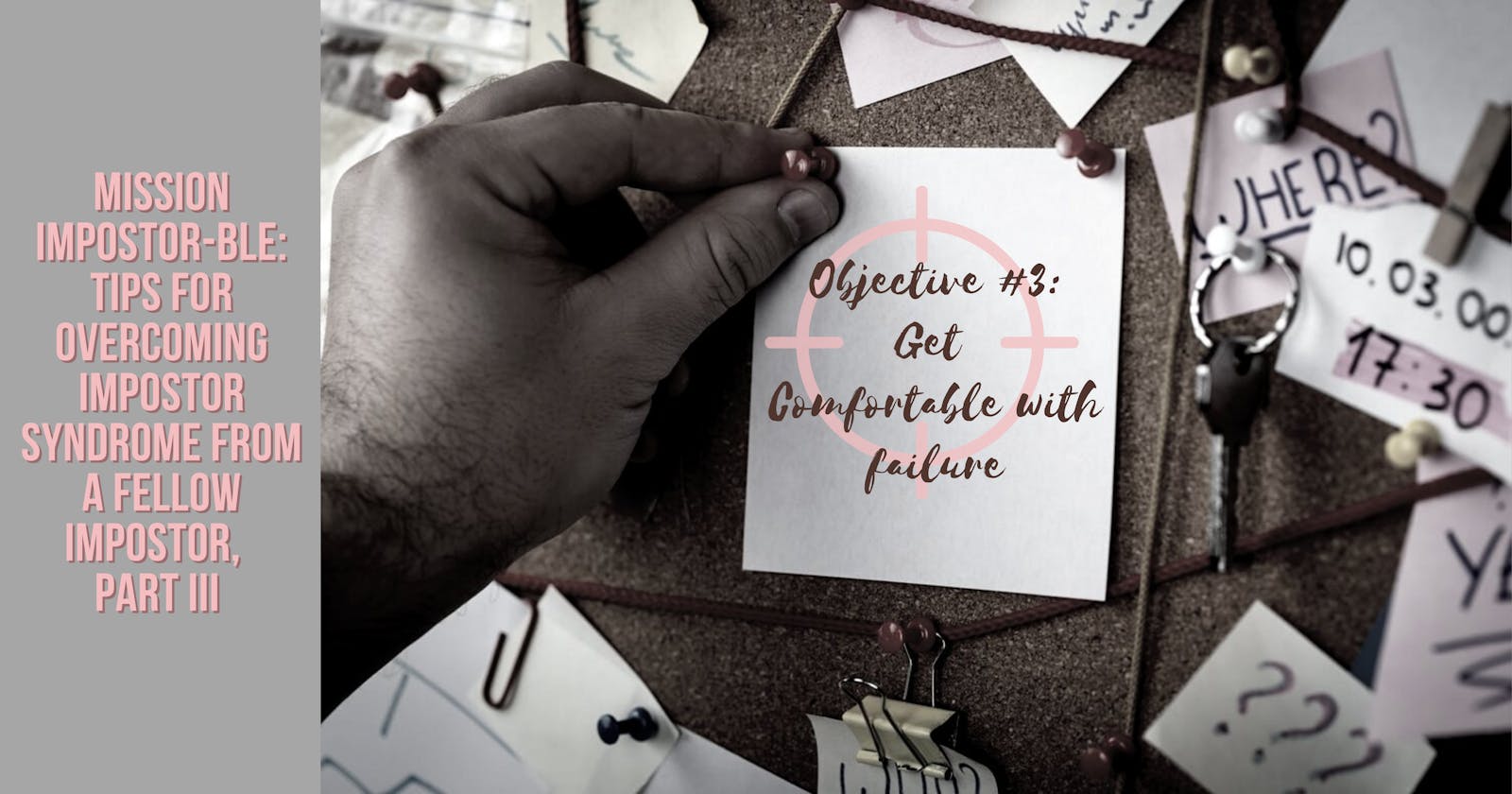Mission Impostor-ble: tips for overcoming Impostor Syndrome from a fellow impostor, Part III
Welcome back, Agent Impostor! I hope you remembered to be kind to yourself since our last rendezvous, it goes hand in hand with our next objective. In fact, showing yourself kindness is the foundation necessary to offset the discomfort that comes with objective #3. Before we get into the details, take several moments to reflect positively on your progress in your goals (big or small) and appreciate how far you've come!
Objective #3: Get comfortable with failure.
We will seldom get it right the first time. Often despite our very valiant efforts, there are uncontrollable (or hard to control) forces at play that will rob us of the outcome we had hoped for. But if we change how we view these failures, it can make all the difference. A very wise informant I met once said "Failure is an opportunity to try again. I turn that feeling of rejection into redirection". There's a lot of power in letting ourselves be learners. It all comes down to vulnerability.
What many don't realize is that honesty and vulnerability are what make an exceptional spy. It seems counterproductive in our line of work, but to understand the usefulness of vulnerability, we must look beyond the surface. When most people think vulnerability, they assume weakness. I would argue that it takes an incredible amount of strength to be vulnerable. You are risking something, such as ego or comfort, in order to get closer to your goals or desires (or to assist others in theirs). If we can only fixate on the discomfort without breaking through to the other side, we will stand still and likely resent ourselves for it long after.
This objective takes time and patience to master because it is difficult to confront thoughts and feelings that hold us back or take us down an undesirable path. We usually go so deep undercover during Operation: Shame that we have trouble separating ourselves from the negative attributes we've fused to our being, like makeshift armor in an imaginary war with ourselves.
The next time you feel shame or judgment bubble up, take a deep breath. Then, take another deep breath. Remind yourself that you are not your mistakes or flaws. You are simply a person experiencing these things. Avoid telling yourself "I'm a terrible spy" or "I'm such a failure". Instead, tell yourself "I may be unhappy with my spy skills now, but I am improving with every experience" or "I may have failed this attempt, but I can use this as a learning experience for a better outcome next time." The more you practice, the easier it is to reframe failure as a stepping stone to success and fulfillment. It may help to write down these affirmations or even practice telling them to yourself in the mirror.
Especially for those of us that were often labeled "the smart spy" or "the dumb spy", it is easy to get trapped in a title, whether rightly earned or not. The world of espionage is vast and daunting, and no agent could ever truly know EVERYTHING there is to know about spying. When we admit we don't understand something, we don't lose our "smart" title or uphold our "dumb" title, we simply tried something and now have an opportunity to learn from that trial, regardless of the initial outcome. Just like every other tool in an agent's belt, it will take time to accept that failure is just part of the process. While it's ok to feel frustrated at the process, don't forget about objective #2 in our debriefing! You are free to dislike the process, but don't dislike the person (hey, that's you!) for engaging in said process. Be proud of yourself for braving the pain of uncertainty or doubt, and you just might eventually come to respect the process altogether!
It's important to note that in order for vulnerability to be effective, one must establish and uphold clear boundaries. Otherwise, you are bound to be compromised or even burned! If you are unsure of how to set clear boundaries, it is worth taking the time to learn more about it, as boundaries pertain to every part of your life. Seriously. (I recommend Set Boundaries, Find Peace: A Guide to Reclaiming Yourself by Nedra Glover Tawwab )
Another crucial aspect of getting comfortable with failure is carefully managing the knowledge you build along the way. Whatever you are learning, you must build a strong foundation for that concept to live on and expand. This can be achieved through active recall and spaced repetition. We'll address these concepts in more detail in a future mission, but in the meantime you can look at the works of Agent Barbara Oakley Learning How to Learn and Agent Ali Abdaal Active Recall & Spaced Repetition for detailed tips on getting started.
END OF TRANSMISSION. PLEASE STAY TUNED FOR YOUR NEXT OBJECTIVE, AGENT IMPOSTOR!
Thanks for reading! Please let me know what you think about this blog in the comments below. What strategies do you use to get comfortable with failure, or to overcome Impostor Syndrome in general?
